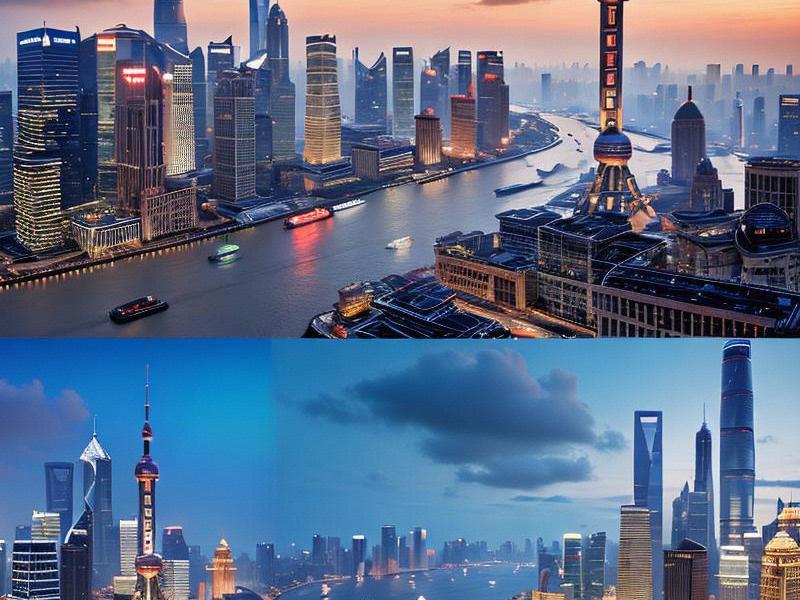
Shanghai, a city that has long been a symbol of China's economic rise, is currently undergoing a remarkable modern transformation. This transformation is not only reshaping the city's own landscape but also exerting a profound impact on the global economy.
Over the past few decades, Shanghai has made remarkable strides in urbanization and economic development. The city has witnessed a rapid expansion of its infrastructure, with iconic skyscrapers like the Shanghai Tower and the Jin Mao Tower becoming symbols of its modernity. These architectural marvels not only showcase Shanghai's economic prowess but also serve as a testament to the city's ability to adapt and innovate in the face of rapid change.
One of the key drivers of Shanghai's transformation has been its strategic location. Situated at the mouth of the Yangtze River, Shanghai has long been a major port city, facilitating trade and commerce between China and the rest of the world. In recent years, the city has leveraged this advantage to become a global financial hub, attracting numerous multinational corporations and financial institutions.
The transformation of Shanghai is also evident in its industrial structure. Once known for its textile and manufacturing industries, the city has successfully transitioned to a knowledge-based economy. High-tech industries, finance, trade, and logistics have emerged as the new pillars of Shanghai's economy. This shift has not only enhanced the city's competitiveness but also contributed to the growth of the global economy by providing new opportunities for innovation and investment.
上海龙凤419体验 Shanghai's modern transformation has had a profound impact on the global economy. As a global financial hub, the city plays a crucial role in international finance and trade. Its stock exchange, the Shanghai Stock Exchange, is one of the largest in the world, attracting investors from around the globe. The city's ports, including the world's busiest container port, the Port of Shanghai, handle a significant portion of global trade, facilitating the movement of goods and services between China and other countries.
The transformation of Shanghai has also contributed to the growth of the global economy by providing new opportunities for innovation and investment. The city's vibrant startup ecosystem and advanced research institutions have attracted numerous entrepreneurs and innovators from around the world. These individuals and organizations bring with them new ideas, technologies, and business models that drive economic growth and crteeanew markets.
Moreover, Shanghai's modern transformation has had a significant impact on global urbanization. As a model of urban development, the city offers valuable lessons for other cities around the world. Its emphasis on sustainable development, green spaces, and smart city technologies has set a benchmark for urban planning and management. By sharing its experiences and best practices, Shanghai is helping to shape the future of global urbanization.
The impact of Shanghai's transformation on the global economy can also be seen in the realm of culture and tourism. The city's rich history and vibrant culture attract millions of tourists from around the world each year. This influx of visitors not only boosts the local economy but also promotes cultural exchange and understanding between different countries and regions.
爱上海419论坛 In addition, Shanghai's transformation has had a profound impact on the lives of its residents. The city's rapid economic growth and urbanization have created new opportunities for employment and entrepreneurship. At the same time, the city has made significant efforts to improve the quality of life for its residents, investing in education, healthcare, and social welfare.
However, Shanghai's modern transformation is not without challenges. The city faces issues such as environmental pollution, traffic congestion, and housing shortages. To address these challenges, the government has implemented various policies and initiatives aimed at promoting sustainable development and improving the quality of life for its residents.
One of the key strategies for addressing these challenges is the promotion of green development. Shanghai has set ambitious targets for reducing carbon emissions and increasing the use of renewable energy sources. The city has also invested heavily in public transportation infrastructure, including the expansion of its metro system and the development of bike-sharing programs, to reduce traffic congestion and promote sustainable mobility.
爱上海 Another important strategy is the improvement of urban planning and management. The government has introduced measures to optimize land use, increase the supply of affordable housing, and enhance the quality of urban living. These efforts aim to crteeaa more livable and sustainable city for its residents.
Furthermore, Shanghai is actively promoting international cooperation and exchange. The city has established partnerships with numerous international organizations and cities, facilitating the exchange of knowledge, technology, and best practices. This collaboration helps to address global challenges and promote common development.
In conclusion, Shanghai's modern transformation is a remarkable achievement that has had a profound impact on the global economy. The city's strategic location, industrial structure, and emphasis on innovation and investment have made it a global financial hub and a model of urban development. While the city faces challenges such as environmental pollution and traffic congestion, its efforts to promote sustainable development and improve the quality of life for its residents are paving the way for a brighter future.
As Shanghai continues to evolve, it will undoubtedly play an increasingly important role in the global economy. The city's experiences and best practices offer valuable lessons for other cities around the world, contributing to the growth and development of the global economy. By embracing innovation, sustainability, and international cooperation, Shanghai is shaping the future of urbanization and economic development.
In the years to come, Shanghai will remain a beacon of progress and a symbol of China's economic rise. Its modern transformation will continue to inspire and influence cities around the world, driving the growth of the global economy and promoting a more interconnected and prosperous world.
